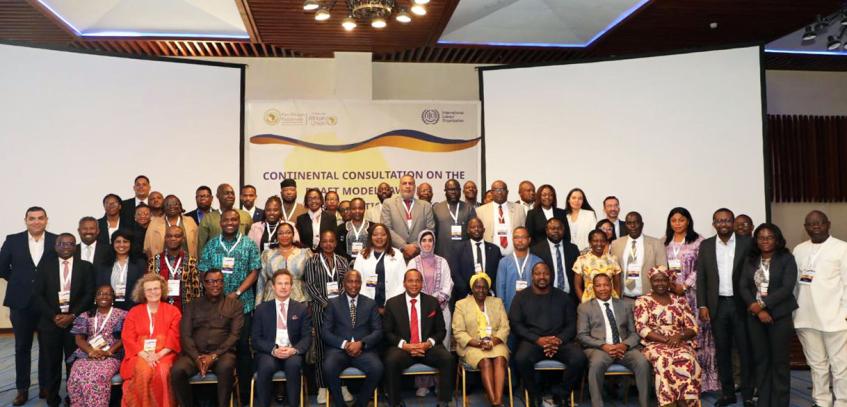Nairobi, Kenya – 16 June 2025 – The Continental Consultation on the Draft Model Law on Labour Migration in Africa, organized by the Pan-African Parliament (PAP) in collaboration with the International Labour Organization (ILO), officially opened on Monday in Nairobi, Kenya. The three-day consultation, running until 18 June, brings together parliamentarians, regional representatives, labour organizations, civil society, and migration experts to review and refine a the legislative framework designed to improve labour migration governance across the continent.
The draft Model Law aims to assist African Union (AU) Member States in harmonizing national laws with international labour standards, thereby strengthening the protection of migrant workers’ rights. It is also a critical step in addressing legislative gaps and policy inconsistencies that hinder effective and fair labour migration across Africa.
The initiative to develop a model law began two years ago, driven by the Pan-African Parliament with the support of the African Union Commission (AUC) and the ILO. The drafting process has been guided by a comprehensive legal and policy paper, which forms the conceptual foundation of the law and aligns with key frameworks such as the African Union Agenda 2063, the AU Social Development Strategic Plan, the Social Policy Framework for Africa, and the Migration Policy Framework for Africa.
In his opening remarks, Hon. John B. Bideri, Chairperson of the PAP Committee on Trade, Customs, and Immigration Matters, underscored the importance of inclusive consultations to ensure the law reflects the priorities of diverse stakeholders.
“Recognizing that effective labour migration governance is essential for reducing smuggling and trafficking in persons, the Pan-African Parliament adopted a Resolution on 11 November 2022 to formulate a Model Law on Labour Migration in Africa. As part of the roadmap developed by the Committee, we are now engaging in continent-wide consultations to gather input from parliamentarians, civil society, AU organs, and ILO and IOM tripartite constituents,” he said.
Hon. Bideri further emphasized that the Model Law will serve as a framework for AU Member States to develop or revise their national laws in line with international labour standards, in keeping with the PAP’s mandate to harmonize legislation across the continent.
Hon. Sen. Danson Mungatana, the Kenyan Head of Delegation to the Pan-African Parliament, warmly welcomed participants to Nairobi, expressing his gratitude for Kenya being chosen as the host country.
“Labour migration, when well-managed, can significantly boost socio-economic development through remittances, knowledge transfer, and skills exchange. These benefits uplift not only migrant workers but also their families and communities,” he noted.
Mr. Khumbula Ndaba, Director of the ILO Country Office for Ethiopia, Djibouti, Somalia, Sudan, and South Sudan, reaffirmed the ILO’s commitment to supporting AU Member States in protecting migrant workers.
“The ILO is proud to support this journey and is committed to providing technical assistance to the Pan-African Parliament in the development of the Model Law on Labour Migration in Africa. This aligns with our core mission to promote social justice and uphold international labour rights,” he stated.
Calling the consultation a “historic moment,” Mr. Wonesai Sithole, Regional Sustainable Development Specialist at the International Organization for Migration (IOM), highlighted the potential of the Model Law to address systemic challenges and propose durable solutions.
“This initiative is more than just legal reform — it is a transformative tool. Properly developed labour laws can tackle the root causes of migration and pave the way for progress,” he said.
“Parliamentarians must be at the centre of this conversation. As Africa’s population—and especially its youth—continues to grow, this Model Law offers a unique opportunity to create a shared framework that harnesses our demographic dividend.”
H.E. Ambassador Hans Henric Lundquist, Sweden’s Permanent Representative to the African Union, IGAD, and UNECA, and Ambassador to Ethiopia and Djibouti, reaffirmed the European Union’s commitment to regional integration and labour migration.
“Sweden is proud to support this process. We believe that a well-crafted Model Law on Labour Migration will foster regional integration and cooperation based on evidence-based policy and shared values,” he said.
Through an interactive format and plenary sessions designed to encourage feedback and dialogue, the consultation seeks to align the draft Model Law with continental priorities. These include improving legal coherence and advancing AU Member States’ capacity to enact robust labour migration policies.
Once finalized, the Model Law is expected to significantly advance the protection of migrant workers by supporting the ratification, domestication, and implementation of key international instruments, including:
- ILO Migration for Employment Convention (No. 97)
- ILO Migrant Workers Convention (No. 143)
- ILO Private Recruitment Agencies Convention (No. 181)
- ILO Domestic Workers Convention (No. 189)
- ILO Violence and Harassment Convention (No. 190)
- 2014 Protocol to the ILO Forced Labour Convention
- UN International Convention on the Protection of the Rights of All Migrant Workers and Members of Their Families (ICRMW)








